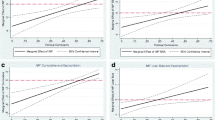Abstract
We examine the effect of international trade on expropriation in a setting where law enforcement is costly. We show that, in general equilibrium, trade liberalization can reduce expropriation activities and have a first-order effect on the gains from trade. One interpretation of our results is that unskilled-labor abundant countries facing popular militia or rebel groups will experience amplified gains from trade, as expropriation levels and cost of enforcement decline with trade liberalization. However, the model also admits the possibility that globalization causes an increase in crime, particularly for skilled-labor abundant countries.
Similar content being viewed by others
References
Acemoglu D.: A simple model of inefficient institutions. Scand J Econ 108(4), 515–546 (2006)
Anderson J.E., Bandiera O.: Traders, cops and robbers. J Int Econ 70(1), 197–215 (2006)
Anderson J.E., Marcouiller D.: Anarchy and autarky: endogenous predation as a barrier to trade. Int Econ Rev 46(1), 189–213 (2005)
Andreas P.: Criminalizing consequences of sanctions: embargo busting and its legacy. Int Stud Q 49(2), 335–360 (2005)
Batra G., Kaufmann D., Stone A.: The firms speak: what the world business environment survey tells us about constraints on private sector development. In: Fields, G., Pfeffermann, G. (eds) Pathways Out of Poverty: Private Firms and Economic Mobility in Developing Countries, Kluwer Academic Publishers, Washington, DC (2003)
Becker G.S.: Crime and punishment: an economic approach. J Political Econ 76(2), 169–217 (1968)
Bhagwati J.N.: Directly unproductive, profit-seeking (DUP) activities. J Political Econ 90(5), 988–1002 (1982)
Borjas, G.J., Grogger, J., Hanson, G.H.: Immigration and African–American employment opportunities: the response of wages, employment, and incarceration to labor supply shocks? NBER Working Paper w12518, NBER (2006)
Boulding K.E.: Conflict and Defense. University Press of America, Lanham (1988)
Boyd J.H., Jalal A., Kim J.: A general equilibrium investigation of handguns, cops and robbers. Econ Theory 33, 493–507 (2007)
Brooks R.A.: Sanctions and regime type: what works, and when. Secur Stud 11(4), 1–50 (2002)
Brysk A., Wise C.: Liberalization and ethnic conflict in Latin America. Stud Comp Int Develop 32(2), 76–104 (1997)
Bussmann M., Schneider G., Wiesehomeier N.: Foreign economic liberalization and peace: the case of Sub-Saharan Africa. Eur J Int Relat 11(4), 551–579 (2005)
Collier P., Gunning J.W.: Explaining African economic performance. J Econ Lit 37(1), 64–111 (1999)
Collier P., Hoeffler A.: Greed and grievance in civil war. Oxford Econ Pap 56(4), 563–595 (2004)
Corchón L., Dahm M.: Foundations for contest success functions. Econ Theory 43(1), 81–98 (2010)
Dal Bó, E., Dal Bó, P.: Workers, warriors, and criminals: social conflict in general equilibrium. J Eur Econ Assoc (forthcoming)
Deraniyagala S.: The political economy of civil conflict in Nepal. Oxford Develop Stud 33(1), 47–62 (2005)
Dube O., Vargasz J.F.: Commodity price shocks and civil conflict: evidence from Colombia. Harvard University, Mimeo (2007)
Elbadawi I., Hegre H.: Globalization, economic shocks, and internal armed conflict. J Econ History 19(1), 37–60 (2008)
Garfinkel M.R., Skaperdas S., Syropoulos C.: Globalization and domestic conflict. J Int Econ 76(2), 296–308 (2008)
Grossman H.I., Kim M.S.: Swords or plowshares? A theory of the security of claims to property. J Political Econ 103(6), 1275–1288 (1995)
Hafner-Burton E.M.: Right or robust? The sensitive nature of repression to globalization. J Peace Res 42(6), 679–698 (2005)
Hirshleifer J.: The analytics of continuing conflict. Synthese 76(2), 201–233 (1988)
Hirshleifer J.: The Dark Side of the Force: Economic Foundations of Conflict Theory. Cambridge University Press, Cambridge (2001)
ILO: Global report under the follow-up to the ILO declaration on fundamental principles and rights at work. Tech. rep. Intrenational Labour Organisation, Geneva (2005)
Imrohoroğlu A., Merlo A., Rupert P.: On the political economy of income redistribution and crime. Int Econ Rev 41(1), 1–25 (2000)
Imrohoroğlu A., Merlo A., Rupert P.: What accounts for the decline in crime. Int Econ Rev 45(3), 707–729 (2004)
Kaufmann, D., Kraay, A.: Growth without governance. Working Paper 2923, World Bank (2002)
Kaufmann, D., Kraay, A., Zoido-Lobatón, P.: Governance matters. World Bank Policy Research Working Paper Working Paper 2196, World Bank (1999)
Keefer, P.: Goverance and economic growth. In: Winters, L.A., Yusuf, S. (eds.) Dancing With Giants: China India and the Global Economy. The World Bank (2007)
Keen D.: Liberalization and conflict. Int Political Sci Rev 26(1), 73–89 (2005)
Knack S., Azfar O.: Trade intensity, country size and corruption. Econ Gov 1(4), 1–18 (2003)
Pablo F., Lederman D., Loayza N.: What causes violent crime. Eur Econ Rev 46(7), 1323–1357 (2002)
Rai K.B., Sarin R.: Generalised contest success functions. Econ Theory 40(1), 139–149 (2009)
Robson A., Skaperdas S.: Costly enforcement of property rights and the Coase theorem. Econ Theory 36(1), 109–128 (2008)
Rodrik D.: Has Globalization Gone too Far. Institute for International Economics, Washington, DC (1997)
Russett B., Oneal J.: Triangulating Peace. Democracy, Interdependence, and International Organizations. Norton, New York (2001)
Skaperdas S.: Contest success functions. Econ Theory 7(2), 283–290 (1996)
Skaperdas S., Syropoulos C.: Guns, butter and openness: on the relationship berween security and trade. Am Econ Rev 91(2), 353–357 (2001)
Soares R.R.: Development, crime and punishment: accounting for the international differences in crime rates. J Develop Econ 73(1), 155–184 (2004)
Stefanadis, C.: Appropriation, property rights institutions, and international trade. Am Econ J Econ Policy (forthcoming)
Stiglitz J.E.: Globalization and its Discontents. Allen Lane, London (2002)
Wade R.H.: Is globalization reducing poverty and inequality. World Develop 32(4), 567–589 (2004)
Author information
Authors and Affiliations
Corresponding author
Additional information
Ghosh and Robertson gratefully acknowledge financial support from the Australian Research Council.
We thank an anonymous referee for his constructive comments and suggestions. We also wish to thank Luis Corchón, Mukesh Eswaran, Niven Winchester for their helpful comments. We also acknowledge comments and discussions from participants at the following: The Australian Development Economics Workshop, Sydney, 2007; The Australian Conference of Economists at Adelaide, 2009; the International Trade Workshop, University of Otago, 2007, and the United Nations—WIDER Conference on Fragile States in Helsinki, 2007.
Rights and permissions
About this article
Cite this article
Ghosh, A., Robertson, P.E. Trade and expropriation. Econ Theory 50, 169–191 (2012). https://doi.org/10.1007/s00199-010-0559-5
Received:
Accepted:
Published:
Issue Date:
DOI: https://doi.org/10.1007/s00199-010-0559-5




